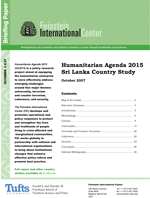This study contributes to the Humanitarian Agenda 2015 (HA2015) country paper series by examining the issues of universality, terrorism, coherence and security in relation to the humanitarian enterprise in Sri Lanka. Through individual interviews, focal group discussions and questionnaires this study analyses the responses from 245 respondents comprising aid workers, aid recipients, non-recipients and observers of assistance in Colombo and the districts of Galle, Trincomalle, Kandy and Anuradhapura.
The study’s four themes and the shaping of the respondents’ perceptions are framed against descriptions of four key periods: the first conflict period (1983-2001) between the forces of the secessionist Liberation Tigers of Tamil Eelam (LTTE) and the Government of Sri Lanka (GoSL); the post-ceasefire agreement period (2002-2005); the post-tsunami period (2005-2007) and, the overlapping emergence of a second conflict phase (2004-2007). Universality was found not to be significantly challenged in Sri Lanka. Western involvement, as long as it avoided clashing with local culture and religion, was both welcomed and expected. However, the humanitarian community is widely regarded as a self-serving enterprise. The suspicion that agencies were using humanitarian action to pursue other agendas, especially pro-LTTE leanings, was found to be particularly prevalent. Aid agencies were identified as being ineffective in communicating their mandates. This failure of communications enables local political interests to construct populist interpretations of humanitarianism.







